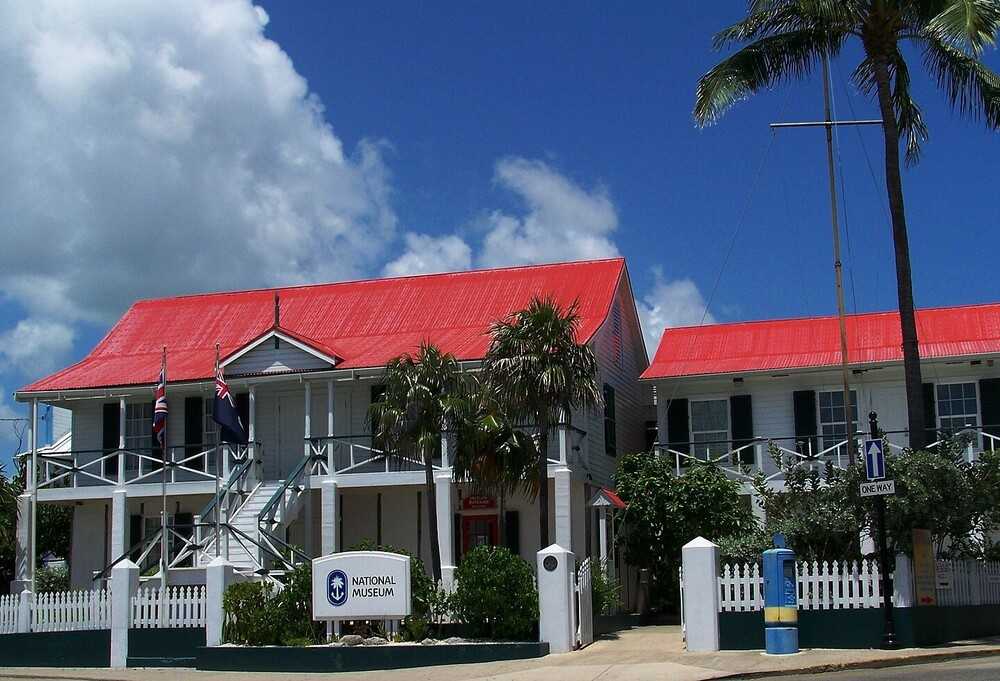Cayman Islands - KY - CYM - CAY - Central America and the Caribbean
Last updated: January 20, 2026
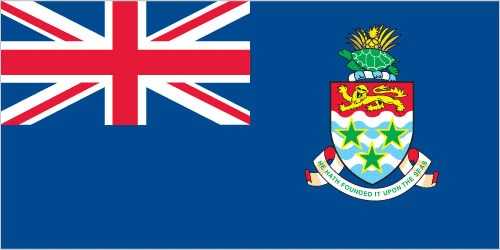
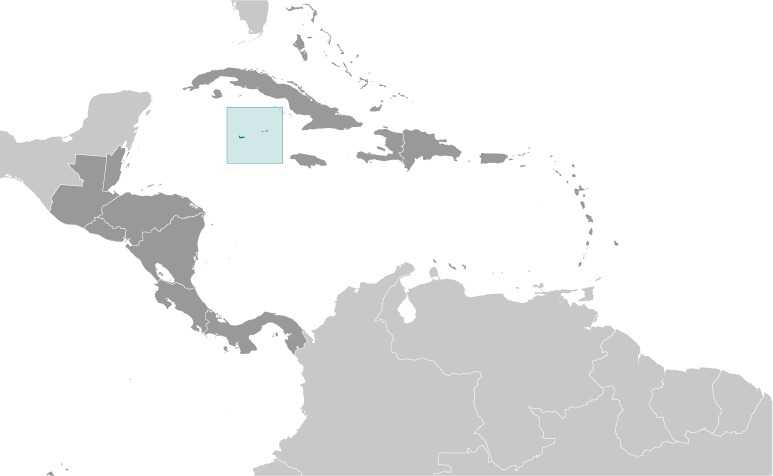
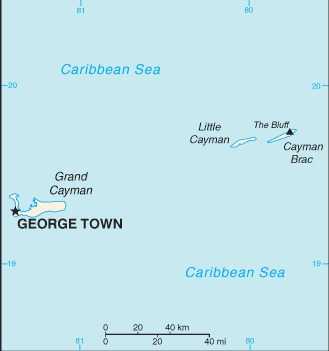
Cayman Islands Images
Cayman Islands Factbook Data
Dependency status
overseas territory of the UK
Diplomatic representation from the US
embassy: none (overseas territory of the UK); consular services provided through the US Embassy in Jamaica
Age structure
0-14 years: 17.4% (male 5,845/female 5,767)
15-64 years: 65.9% (male 21,480/female 22,456)
65 years and over: 16.7% (2024 est.) (male 5,054/female 6,051)
15-64 years: 65.9% (male 21,480/female 22,456)
65 years and over: 16.7% (2024 est.) (male 5,054/female 6,051)
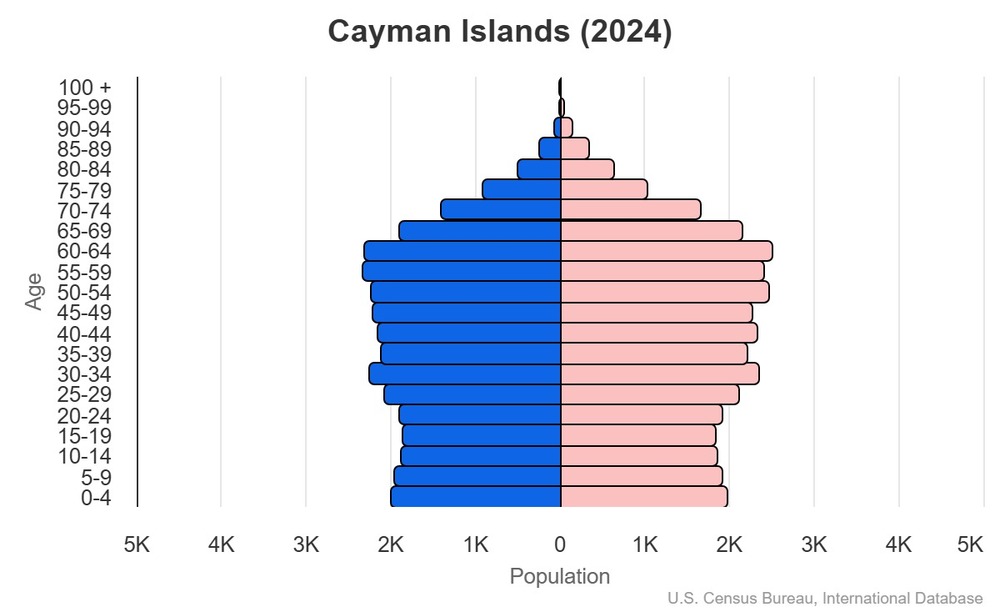
This is the population pyramid for the Cayman Islands. A population pyramid illustrates the age and sex structure of a country's population and may provide insights about political and social stability, as well as economic development. The population is distributed along the horizontal axis, with males shown on the left and females on the right. The male and female populations are broken down into 5-year age groups represented as horizontal bars along the vertical axis, with the youngest age groups at the bottom and the oldest at the top. The shape of the population pyramid gradually evolves over time based on fertility, mortality, and international migration trends.
For additional information, please see the entry for Population pyramid on the Definitions and Notes page.
For additional information, please see the entry for Population pyramid on the Definitions and Notes page.
Geographic coordinates
19 30 N, 80 30 W
Sex ratio
at birth: 1.02 male(s)/female
0-14 years: 1.01 male(s)/female
15-64 years: 0.96 male(s)/female
65 years and over: 0.84 male(s)/female
total population: 0.95 male(s)/female (2024 est.)
0-14 years: 1.01 male(s)/female
15-64 years: 0.96 male(s)/female
65 years and over: 0.84 male(s)/female
total population: 0.95 male(s)/female (2024 est.)
Natural hazards
hurricanes (July to November)
Area - comparative
1.5 times the size of Washington, D.C.
Background
The British colonized the Cayman Islands during the 18th and 19th centuries, and Jamaica -- also a British colony at the time -- administered the islands after 1863. In 1959, the islands became a territory within the Federation of the West Indies. When the Federation dissolved in 1962, the Cayman Islands chose to remain a British dependency. The territory has transformed itself into a significant offshore financial center.
Environmental issues
no natural freshwater resources; trash washing up or being deposited on beaches; no recycling or waste-treatment facilities; deforestation
Exports - commodities
aircraft, ships, refined petroleum, natural gas, broadcasting equipment (2023)
note: top five export commodities based on value in dollars
note: top five export commodities based on value in dollars
Administrative divisions
6 districts; Bodden Town, Cayman Brac and Little Cayman, East End, George Town, North Side, West Bay
Agricultural products
vegetables, fruit; livestock; turtle farming
Military and security forces
no regular military forces; Royal Cayman Islands Police Service
Budget
revenues: $874.5 million (2017 est.)
expenditures: $766.6 million (2017 est.)
expenditures: $766.6 million (2017 est.)
Capital
name: George Town (on Grand Cayman)
geographic coordinates: 19 18 N, 81 23 W
time difference: UTC-5 (same time as Washington, DC, during Standard Time)
etymology: originally named Hogstyes, the town was renamed in honor of English King GEORGE III (1738-1820) around 1800
geographic coordinates: 19 18 N, 81 23 W
time difference: UTC-5 (same time as Washington, DC, during Standard Time)
etymology: originally named Hogstyes, the town was renamed in honor of English King GEORGE III (1738-1820) around 1800
Imports - commodities
ships, refined petroleum, cars, furniture, jewelry (2023)
note: top five import commodities based on value in dollars
note: top five import commodities based on value in dollars
Climate
tropical marine; warm, rainy summers (May to October) and cool, relatively dry winters (November to April)
Coastline
160 km
Constitution
history: several previous; latest approved 10 June 2009, entered into force 6 November 2009 (The Cayman Islands Constitution Order 2009)
Exchange rates
Caymanian dollars (KYD) per US dollar -
Exchange rates:
0.833 (2024 est.)
0.833 (2023 est.)
0.833 (2022 est.)
0.833 (2021 est.)
0.833 (2020 est.)
Exchange rates:
0.833 (2024 est.)
0.833 (2023 est.)
0.833 (2022 est.)
0.833 (2021 est.)
0.833 (2020 est.)
Executive branch
chief of state: King CHARLES III (since 8 September 2022); represented by Governor Jane OWEN (since 21 April 2023)
head of government: Premier André Martin EBANKS (since 6 May 2025)
cabinet: Cabinet selected from the Parliament and appointed by the governor on the advice of the premier
election/appointment process: the monarchy is hereditary; governor appointed by the monarch; following legislative elections, the governor appoints the leader of the majority party or majority coalition as premier
head of government: Premier André Martin EBANKS (since 6 May 2025)
cabinet: Cabinet selected from the Parliament and appointed by the governor on the advice of the premier
election/appointment process: the monarchy is hereditary; governor appointed by the monarch; following legislative elections, the governor appoints the leader of the majority party or majority coalition as premier
Flag
description: a blue field with the UK flag in the upper-left quadrant and the Caymanian coat of arms centered on the right half of the flag; the coat of arms has a pineapple, a turtle, a shield with a golden lion and three green stars, and a scroll below the shield with the motto HE HATH FOUNDED IT UPON THE SEAS
meaning: the pineapple represents ties to Jamaica; the turtle represents the Caymans' seafaring tradition; the lion symbolizes Great Britain; the green stars represent the three islands; the white and blue wavy lines on the coat of arms represent the sea
meaning: the pineapple represents ties to Jamaica; the turtle represents the Caymans' seafaring tradition; the lion symbolizes Great Britain; the green stars represent the three islands; the white and blue wavy lines on the coat of arms represent the sea
Independence
none (overseas territory of the UK)
Industries
tourism, banking, insurance and finance, construction, construction materials, furniture
Judicial branch
highest court(s): Court of Appeal (consists of the court president and at least 2 judges); Grand Court (consists of the court president and at least 2 judges)
judge selection and term of office: Court of Appeal and Grand Court judges appointed by the governor on the advice of the Judicial and Legal Services Commission, an 8-member independent body consisting of governor appointees, Court of Appeal president, and attorneys; Court of Appeal judges' tenure based on their individual instruments of appointment; Grand Court judges normally appointed until retirement at age 65 but can be extended until age 70
subordinate courts: Summary Court
note: appeals beyond the Court of Appeal are heard by the Judicial Committee of the Privy Council (in London)
judge selection and term of office: Court of Appeal and Grand Court judges appointed by the governor on the advice of the Judicial and Legal Services Commission, an 8-member independent body consisting of governor appointees, Court of Appeal president, and attorneys; Court of Appeal judges' tenure based on their individual instruments of appointment; Grand Court judges normally appointed until retirement at age 65 but can be extended until age 70
subordinate courts: Summary Court
note: appeals beyond the Court of Appeal are heard by the Judicial Committee of the Privy Council (in London)
Land boundaries
total: 0 km
Land use
agricultural land: 11.2% (2023 est.)
arable land: 0.8% (2023 est.)
permanent crops: 2.1% (2023 est.)
permanent pasture: 8.3% (2023 est.)
forest: 53% (2023 est.)
other: 35.8% (2023 est.)
arable land: 0.8% (2023 est.)
permanent crops: 2.1% (2023 est.)
permanent pasture: 8.3% (2023 est.)
forest: 53% (2023 est.)
other: 35.8% (2023 est.)
Legal system
English common law and local statutes
Legislative branch
legislature name: Parliament
legislative structure: unicameral
number of seats: 21 (directly elected and appointed)
scope of elections: full renewal
term in office: 4 years
most recent election date: 4/14/2021
parties elected and seats per party: independent (12); PPM (7)
percentage of women in chamber: 23.8%
expected date of next election: 2025
legislative structure: unicameral
number of seats: 21 (directly elected and appointed)
scope of elections: full renewal
term in office: 4 years
most recent election date: 4/14/2021
parties elected and seats per party: independent (12); PPM (7)
percentage of women in chamber: 23.8%
expected date of next election: 2025
Maritime claims
territorial sea: 12 nm
exclusive economic zone: 200 nm
exclusive fishing zone: 200 nm
exclusive economic zone: 200 nm
exclusive fishing zone: 200 nm
International organization participation
Caricom (associate), CDB, Interpol (subbureau), IOC, UNESCO (associate), UPU
National holiday
Constitution Day, the first Monday in July (1959)
Nationality
noun: Caymanian(s)
adjective: Caymanian
adjective: Caymanian
Natural resources
fish, climate and beaches that foster tourism
Geography - note
important location between Cuba and Central America
Economic overview
dominant offshore banking territory; services sector accounts for over 85% of economic activity; recently adopted a fiscal responsibility framework to combat tax evasion and money laundering; large tourism sector; does not have any welfare system; high standard of living
Political parties
Cayman Islands Peoples Party or CIPP
People's Progressive Movement or PPM
People's Progressive Movement or PPM
Suffrage
18 years of age; universal
Terrain
low-lying limestone base surrounded by coral reefs
Government type
parliamentary democracy; self-governing overseas territory of the UK
Military - note
defense is the responsibility of the UK
Country name
conventional long form: none
conventional short form: Cayman Islands
etymology: Spanish explorers named the islands in the early 16th century, using the Carib word for marine crocodiles, caiman
conventional short form: Cayman Islands
etymology: Spanish explorers named the islands in the early 16th century, using the Carib word for marine crocodiles, caiman
Location
Caribbean, three-island group (Grand Cayman, Cayman Brac, Little Cayman) in Caribbean Sea, 240 km south of Cuba and 268 km northwest of Jamaica
Map references
Central America and the Caribbean
Irrigated land
NA
Diplomatic representation in the US
none (overseas territory of the UK)
Internet users
percent of population: 81% (2017 est.)
Internet country code
.ky
GDP (official exchange rate)
$7.139 billion (2023 est.)
note: data in current dollars at official exchange rate
note: data in current dollars at official exchange rate
Urbanization
urban population: 100% of total population (2023)
rate of urbanization: 1.13% annual rate of change (2020-25 est.)
rate of urbanization: 1.13% annual rate of change (2020-25 est.)
Broadcast media
4 TV stations; cable and satellite subscription services offer international programming; government-owned Radio Cayman operates 2 networks broadcasting on 5 stations; 10 privately owned radio stations operate alongside Radio Cayman
Drinking water source
improved:
urban: 95.5% of population (2022 est.)
total: 95.5% of population (2022 est.)
unimproved:
urban: 4.5% of population (2022 est.)
total: 4.5% of population (2022 est.)
urban: 95.5% of population (2022 est.)
total: 95.5% of population (2022 est.)
unimproved:
urban: 4.5% of population (2022 est.)
total: 4.5% of population (2022 est.)
National anthem(s)
title: "Beloved Isle Cayman"
lyrics/music: Leila E. ROSS
history: adopted 1960; served as an unofficial anthem since 1930
_____
title: "God Save the King"
lyrics/music: unknown
history: official anthem, as an overseas UK territory
lyrics/music: Leila E. ROSS
history: adopted 1960; served as an unofficial anthem since 1930
_____
title: "God Save the King"
lyrics/music: unknown
history: official anthem, as an overseas UK territory
Major urban areas - population
35,000 GEORGE TOWN (capital) (2018)
National symbol(s)
green sea turtle
Population distribution
majority of the population resides on Grand Cayman
Electricity access
electrification - total population: 100% (2022 est.)
Civil aircraft registration country code prefix
VP-C
Sanitation facility access
improved:
urban: 93.5% of population (2022 est.)
total: 93.5% of population (2022 est.)
unimproved:
urban: 6.5% of population (2022 est.)
total: 6.5% of population (2022 est.)
urban: 93.5% of population (2022 est.)
total: 93.5% of population (2022 est.)
unimproved:
urban: 6.5% of population (2022 est.)
total: 6.5% of population (2022 est.)
Ethnic groups
Cayman Islander 35.4%, Jamaican 24.8%, Filipino 5.5%, British 5.3%, American 5.2%, Honduran 4.2%, Canadian 3.3%, Indian 2.1%, Cuban 1.6%, Nicaraguan 1%, other 11.1%, unspecified 0.5% (2021 est.)
note: data represent population by country of birth
note: data represent population by country of birth
Religions
Protestant 60.8% (includes Church of God 19.5%, Seventh Day Adventist 8.7%, non-denominational 8.3%, Baptist 6.9%, Pentecostal 6.8%, Presbyterian/United Church 5.7%, Anglican 2.8%, Wesleyan Holiness 1.5%, Methodist 0.5%), Roman Catholic 13.6%, Hindu 1.7%, Jehovah's Witness 0.9%, other 4.8%, none 16.7%, unspecified 1.4% (2021 est.)
Languages
English (official) 88.8%, Spanish 3.9%, Filipino 3.8%, other 2.8%, unspecified 0.7% (2021 est.)
note: data represent main language spoken at home
note: data represent main language spoken at home
Refugees and internally displaced persons
refugees: 65 (2024 est.)
Elevation
highest point: 1 km SW of The Bluff on Cayman Brac 50 m
lowest point: Caribbean Sea 0 m
lowest point: Caribbean Sea 0 m
Imports - partners
Germany 30%, USA 29%, Italy 20%, Turkey 5%, China 5% (2023)
note: top five import partners based on percentage share of imports
note: top five import partners based on percentage share of imports
Exports - partners
UK 40%, Cyprus 21%, Germany 9%, Grenada 8%, Italy 5% (2023)
note: top five export partners based on percentage share of exports
note: top five export partners based on percentage share of exports
Waste and recycling
municipal solid waste generated annually: 60,000 tons (2024 est.)
Electricity generation sources
fossil fuels: 96.7% of total installed capacity (2023 est.)
solar: 3.1% of total installed capacity (2023 est.)
wind: 0.1% of total installed capacity (2023 est.)
solar: 3.1% of total installed capacity (2023 est.)
wind: 0.1% of total installed capacity (2023 est.)
Petroleum
refined petroleum consumption: 5,000 bbl/day (2023 est.)
Gross reproduction rate
0.9 (2025 est.)
Remittances
0.2% of GDP (2023 est.)
0.2% of GDP (2022 est.)
0.2% of GDP (2021 est.)
note: personal transfers and compensation between resident and non-resident individuals/households/entities
0.2% of GDP (2022 est.)
0.2% of GDP (2021 est.)
note: personal transfers and compensation between resident and non-resident individuals/households/entities
Ports
total ports: 2 (2024)
large: 0
medium: 0
small: 0
very small: 2
ports with oil terminals: 2
key ports: Cayman Brac, Georgetown
large: 0
medium: 0
small: 0
very small: 2
ports with oil terminals: 2
key ports: Cayman Brac, Georgetown
National coat of arms
the Queen of England approved the Cayman Islands' coat of arms -- which was designed with input from the public -- in 1958; the shield features the lion of England and three green stars that symbolize the three islands of Grand Cayman, Cayman Brac, and Little Cayman; the green turtle stands for the islands’ seafaring history, the rope under it for the thatch-rope industry, and the pineapple for historical ties with Jamaica; the motto comes from Psalms 24, acknowledging the Caymans’ Christian heritage
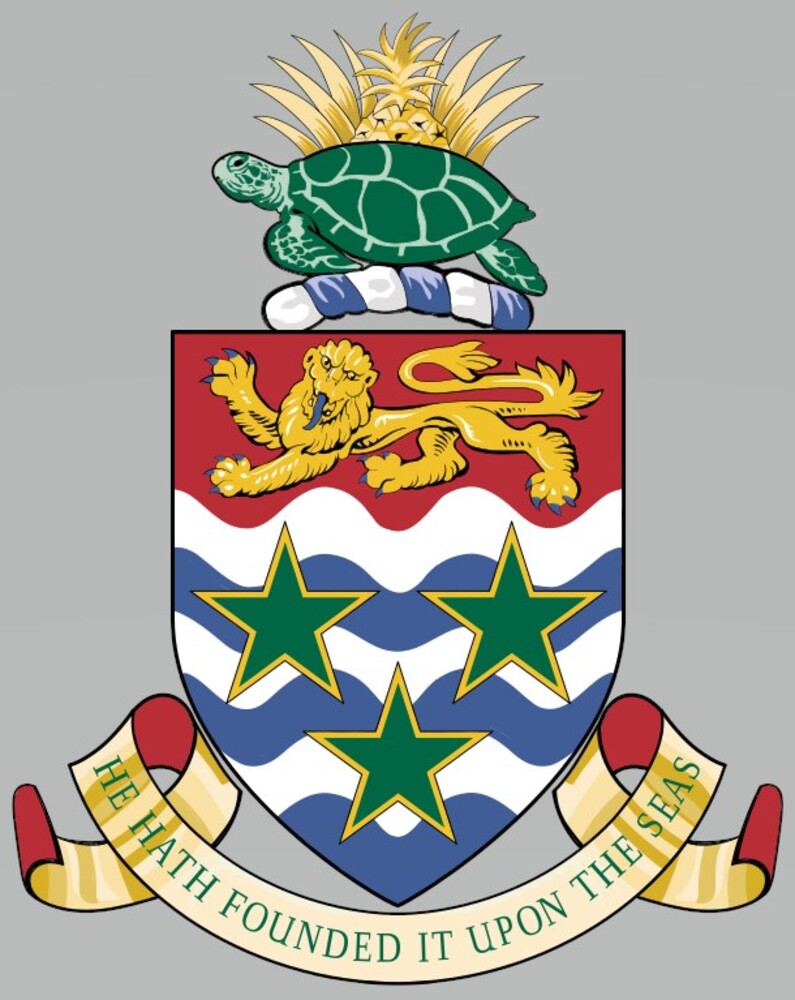
The Cayman Islands is a British dependency, and the Queen of England approved its coat of arms – which was designed with input from the public -- in 1958. The shield features the lion of England and three green stars that symbolize the three islands of Grand Cayman, Cayman Brac, and Little Cayman. The green turtle recalls the islands’ seafaring history, and the rope under it refers to the thatch rope industry. The pineapple references historical ties with Jamaica. The motto comes from Psalms 24, acknowledging the Caymans’ Christian heritage.
Net migration rate
11.91 migrant(s)/1,000 population (2025 est.)
Median age
total: 41.3 years (2025 est.)
male: 40.3 years
female: 42 years
male: 40.3 years
female: 42 years
Reserves of foreign exchange and gold
$234 million (2023 est.)
$225.4 million (2022 est.)
$228.3 million (2021 est.)
note: holdings of gold (year-end prices)/foreign exchange/special drawing rights in current dollars
$225.4 million (2022 est.)
$228.3 million (2021 est.)
note: holdings of gold (year-end prices)/foreign exchange/special drawing rights in current dollars
Total fertility rate
1.81 children born/woman (2025 est.)
Carbon dioxide emissions
737,000 metric tonnes of CO2 (2023 est.)
from petroleum and other liquids: 737,000 metric tonnes of CO2 (2023 est.)
from petroleum and other liquids: 737,000 metric tonnes of CO2 (2023 est.)
Area
total : 264 sq km
land: 264 sq km
water: 0 sq km
land: 264 sq km
water: 0 sq km
Real GDP (purchasing power parity)
$5.705 billion (2023 est.)
$5.467 billion (2022 est.)
$5.199 billion (2021 est.)
note: data in 2021 dollars
$5.467 billion (2022 est.)
$5.199 billion (2021 est.)
note: data in 2021 dollars
Airports
3 (2025)
Infant mortality rate
total: 7.1 deaths/1,000 live births (2025 est.)
male: 8.8 deaths/1,000 live births
female: 5.7 deaths/1,000 live births
male: 8.8 deaths/1,000 live births
female: 5.7 deaths/1,000 live births
Inflation rate (consumer prices)
2% (2017 est.)
-0.6% (2016 est.)
-2.3% (2015 est.)
note: annual % change based on consumer prices
-0.6% (2016 est.)
-2.3% (2015 est.)
note: annual % change based on consumer prices
Current account balance
-$712.684 million (2023 est.)
-$749.482 million (2022 est.)
-$794.205 million (2021 est.)
note: balance of payments - net trade and primary/secondary income in current dollars
-$749.482 million (2022 est.)
-$794.205 million (2021 est.)
note: balance of payments - net trade and primary/secondary income in current dollars
Real GDP per capita
$78,100 (2023 est.)
$76,400 (2022 est.)
$74,200 (2021 est.)
note: data in 2021 dollars
$76,400 (2022 est.)
$74,200 (2021 est.)
note: data in 2021 dollars
Broadband - fixed subscriptions
total: 40,000 (2022 est.)
subscriptions per 100 inhabitants: 56 (2022 est.)
subscriptions per 100 inhabitants: 56 (2022 est.)
Energy consumption per capita
143.149 million Btu/person (2023 est.)
Death rate
6.24 deaths/1,000 population (2025 est.)
Birth rate
11.41 births/1,000 population (2025 est.)
Electricity
installed generating capacity: 176,000 kW (2023 est.)
consumption: 698.767 million kWh (2023 est.)
transmission/distribution losses: 2.117 million kWh (2023 est.)
consumption: 698.767 million kWh (2023 est.)
transmission/distribution losses: 2.117 million kWh (2023 est.)
Merchant marine
total: 130 (2023)
by type: bulk carrier 29, container ship 3, general cargo 1, oil tanker 20, other 77
by type: bulk carrier 29, container ship 3, general cargo 1, oil tanker 20, other 77
Imports
$3.444 billion (2023 est.)
$3.287 billion (2022 est.)
$2.808 billion (2021 est.)
note: balance of payments - imports of goods and services in current dollars
$3.287 billion (2022 est.)
$2.808 billion (2021 est.)
note: balance of payments - imports of goods and services in current dollars
Exports
$4.6 billion (2023 est.)
$4.215 billion (2022 est.)
$3.542 billion (2021 est.)
note: balance of payments - exports of goods and services in current dollars
$4.215 billion (2022 est.)
$3.542 billion (2021 est.)
note: balance of payments - exports of goods and services in current dollars
Heliports
5 (2025)
Life expectancy at birth
total population: 82.5 years (2024 est.)
male: 79.8 years
female: 85.2 years
male: 79.8 years
female: 85.2 years
Real GDP growth rate
4.4% (2023 est.)
5.2% (2022 est.)
4.9% (2021 est.)
note: annual GDP % growth based on constant local currency
5.2% (2022 est.)
4.9% (2021 est.)
note: annual GDP % growth based on constant local currency
Industrial production growth rate
3.4% (2022 est.)
note: annual % change in industrial value added based on constant local currency
note: annual % change in industrial value added based on constant local currency
GDP - composition, by sector of origin
agriculture: 0.5% (2022 est.)
industry: 8.2% (2022 est.)
services: 85.4% (2022 est.)
note: figures may not total 100% due to non-allocated consumption not captured in sector-reported data
industry: 8.2% (2022 est.)
services: 85.4% (2022 est.)
note: figures may not total 100% due to non-allocated consumption not captured in sector-reported data
Education expenditure
1.6% of GDP (2023 est.)
15% national budget (2019 est.)
15% national budget (2019 est.)
Population growth rate
1.71% (2025 est.)
Telephones - mobile cellular
total subscriptions: 99,700 (2022 est.)
subscriptions per 100 inhabitants: 139 (2022 est.)
subscriptions per 100 inhabitants: 139 (2022 est.)
Dependency ratios
total dependency ratio: 53 (2025 est.)
youth dependency ratio: 26.6 (2025 est.)
elderly dependency ratio: 26.4 (2025 est.)
potential support ratio: 3.8 (2025 est.)
youth dependency ratio: 26.6 (2025 est.)
elderly dependency ratio: 26.4 (2025 est.)
potential support ratio: 3.8 (2025 est.)
Population
total: 67,816 (2025 est.)
male: 32,930
female: 34,886
male: 32,930
female: 34,886
Telephones - fixed lines
total subscriptions: 35,800 (2022 est.)
subscriptions per 100 inhabitants: 50 (2022 est.)
subscriptions per 100 inhabitants: 50 (2022 est.)
